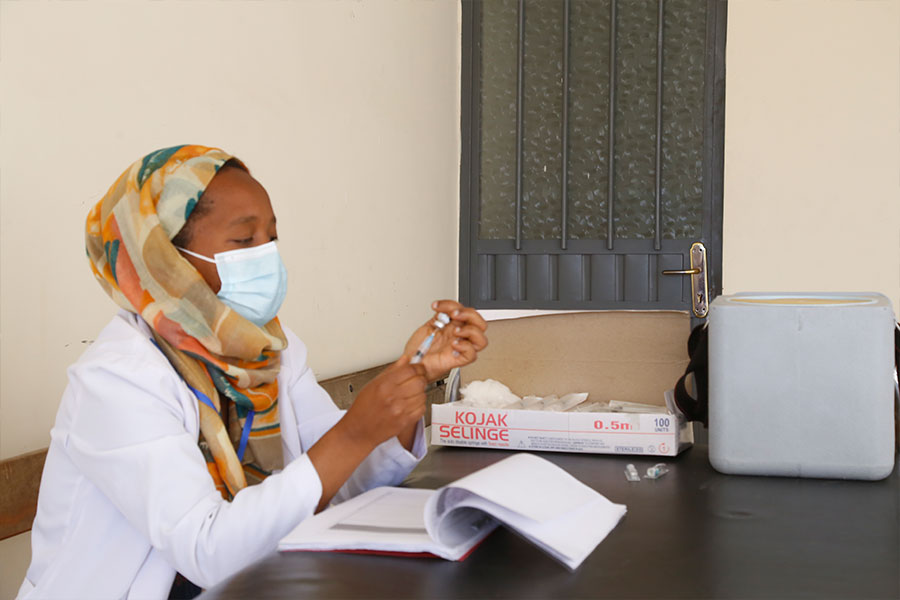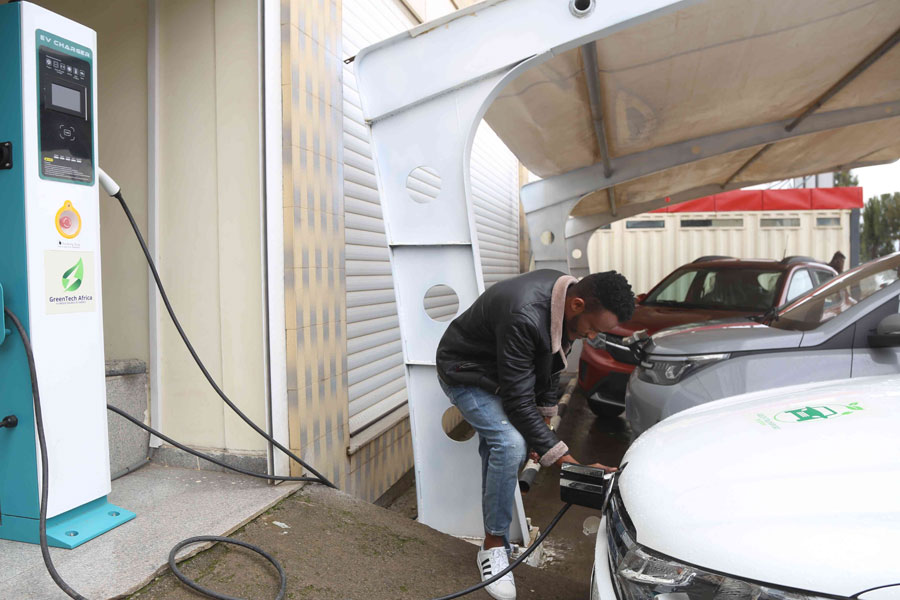
Featured | Apr 30,2021
Jun 20 , 2020
By Daniel Taye
Despite the recent and reasonably worrying spike in the number of cases, it is still possible to overcome this outbreak before it causes devastation. This requires keeping a cool head and acting within our means in a determined and pragmatic way, writes Daniel Taye (taye.daniel@gmail.com), founder and manager of a language services company in Addis Abeba.
The spread of the Novel Coronavirus (COVID-19) pandemic was attended by stark warnings and dire estimates from renowned epidemiologists and public health institutions.
Britain, France and the United States could have seen over three million deaths between them in the absence of drastic containment measures, Imperial College of London warned. These estimates were then extrapolated to other countries, including extremely alarming figures for Africa. Almost every African country, panicked by these forecasts, has put in place drastic lockdown measures whose economic and social consequences will be severe.
Ethiopia, depicted as a country with weak health systems that will not be able to achieve prevention, has opted for measures that include enforcing social distancing rules, limiting public gatherings, closing institutions of higher education and initiating surveillance and screenings. Other interventions have included programmes to raise public awareness and promote frequent hand washing and disinfection of homes.
An article by Prime Minister Abiy Ahmed (PhD) underlined the extreme difficulty for a country such as Ethiopia, which has a large population that lives at a subsistence level, to opt for total lockdown. It was one of the public manifestations of pragmatism that we saw on the African continent with that of Patrice Talon, president of Benin.
Was it the right choice? What can be said four months after the first case of the virus was confirmed on African soil, which has now recorded around a quarter of a million cases and thousands of deaths?
To respond to these concerns, we have to revisit the forecasts on which these emergency containment measures were based.
Mortality figures in countries such as France and the United Kingdom, and even Sweden, which did not adopt strict lockdown measures, do not seem to confirm earlier projections. Recent indications, where the outbreak is plateauing, and even subsiding, show that mortality will be several folds lower even in these most affected countries.
As for Africa, the continent has registered much lower mortality rates without taking measures used in the two European countries, even if we cannot be sure what the pandemic will be like in the near future. The number of lives that could be lost in Africa due to COVID-19 was expected to be between 300,000 and 3.3 million, according to the United Nation’s Economic Commission for Africa’s (UNECA) report back in April 2020.
It is expected practice to resort to the most pessimistic metrics in epidemiology to encourage governments to take precautionary measures. But certain policy options that governments can use to respond could be extremely costly for society. Total lockdown in this pandemic’s case would thus have been too economically costly to justify.
A brief look at the history of epidemic outbreaks reveals that their behaviour is multi-factorial. Their severity depends on the demographics of the population, the ecosystem and human intervention. Influenza, for instance, does not strike in temperate and warm countries as in colder places, while Ebola seems to behave differently in and outside of tropical zones.
It is, therefore, important to first observe the behaviour of the virus in each context and then make projections that reflect reality. Despite the flack Ethiopian authorities receive for a weak health system, there is a case to be made that they should carry out observations, draw out their predictive indicators and develop strategies for the fight against the epidemic. It would be a mistake on our part to attempt to apply similar preventive measures without considering clinical data developed locally.
The same goes for treatments to be used in new diseases such as COVID-19. This question has sparked heated debates in the developed world. On one side are those that demand that we wait for the results of clinical trials conducted with the highest standards. This is in contrast to those that advocate trying out the most promising treatments while waiting for better options, especially if the side effect of the treatments are known to be mild.
Curiously, countries that have best managed to contain the spread of the virus, specifically in South East Asia, have gone beyond a controversy of this kind. China had in February touted Chloroquine, an anti-malarial drug, as an effective treatment with the addition of traditional treatments. South Korea has developed its own protocol, and Japan seems to be betting on another drug, Avigan, which is usually used against the flu.
It is vital to follow this example of pragmatism, and define a treatment plan which borrows from these countries, while monitoring advances in research toward more efficient treatment.
In this atmosphere of irrational panic, Ethiopia must also look into and use its strengths. Its first advantage is the proximity it enjoys with the big winner of this crisis: China. It is already reaping some benefits from it since it has positioned itself as an essential hub for the distribution of Chinese medical aid in Africa and even beyond in recent weeks. This relationship should also extend to learning from their experience with containing COVID-19.
The other strength that it can account for is the health extension programmes, which is a successful and a defining feature of the Ethiopian health system and gives the health authorities an important weapon to detect infectious cases and spread awareness. An army of health workers that can be deployed whenever cheaper testing kits are made available, and whenever a treatment option is developed, will complement the fight against the virus.
While Ethiopia has already undertaken door-to-door screening, these visits need to be frequent. It is an effort that needs to be sustained until the end of the pandemic if it is going to succeed.
Despite the recent and reasonably worrying spike in the number of cases, it is still possible to overcome this outbreak before it causes devastation. This requires keeping a cool head and acting within our means in a determined and pragmatic way.
PUBLISHED ON
Jun 20,2020 [ VOL
21 , NO
1051]


Featured | Apr 30,2021

Radar | Dec 26,2020

Commentaries | Jul 29,2023

Editorial | Aug 29,2020

Viewpoints | Jan 03,2021

Radar | Jun 26,2021

Radar | Sep 26,2021

Fortune News | Nov 13,2021

Fortune News | Aug 01,2020

Agenda | Jul 30,2022

My Opinion | 131584 Views | Aug 14,2021

My Opinion | 127940 Views | Aug 21,2021

My Opinion | 125915 Views | Sep 10,2021

My Opinion | 123539 Views | Aug 07,2021

Dec 22 , 2024 . By TIZITA SHEWAFERAW
Charged with transforming colossal state-owned enterprises into modern and competitiv...

Aug 18 , 2024 . By AKSAH ITALO
Although predictable Yonas Zerihun's job in the ride-hailing service is not immune to...

Jul 28 , 2024 . By TIZITA SHEWAFERAW
Unhabitual, perhaps too many, Samuel Gebreyohannes, 38, used to occasionally enjoy a couple of beers at breakfast. However, he recently swit...

Jul 13 , 2024 . By AKSAH ITALO
Investors who rely on tractors, trucks, and field vehicles for commuting, transporting commodities, and f...

Jun 28 , 2025
Meseret Damtie, the assertive auditor general, has never been shy about naming names...

Jun 21 , 2025
A well-worn adage says, “Budget is not destiny, but it is direction.” Examining t...

Jun 14 , 2025
Yet again, the Horn of Africa is bracing for trouble. A region already frayed by wars...

Jun 7 , 2025
Few promises shine brighter in Addis Abeba than the pledge of a roof for every family...

Jun 29 , 2025
Addis Abeba's first rains have coincided with a sweeping rise in private school tuition, prompting the city's education...

Jun 29 , 2025 . By BEZAWIT HULUAGER
Central Bank Governor Mamo Mihretu claimed a bold reconfiguration of monetary policy...

Jun 29 , 2025 . By BEZAWIT HULUAGER
The federal government is betting on a sweeping overhaul of the driver licensing regi...

Jun 29 , 2025 . By NAHOM AYELE
Gadaa Bank has listed 1.2 million shares on the Ethiopian Securities Exchange (ESX),...